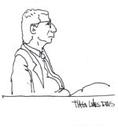spatial planning architecture transport & logistics renaissance dottorati fragile territories landscape design Community neighborhood climate change immigration conferences urban renewal urbanization urban regeneration città storica collaborative urban design digitalization open position downtowns urbanism democrazia commerce inu
Three stories for the XXth Century
Paper presented at the II International Ph.D Seminar on Urbanism
Barcelona, 27 June 05
by Bernardo Secchi
I wrote a book; it is a small but dense book containing no more than two hundred pages and very few images. I hope it will be in the bookshops in September. The title will most likely be "The 20th Century City" [1]. It is a part of a series directed by Donatella Calabi on the history of the western city from antiquity to the present day. Except for myself, all the authors are historians.
While writing this book, I thought of a range of alternative approaches. The first was to summarize the many and valuable histories of the city, architecture and urbanism, but I was not interested in that kind of approach. The second was to write that "such and such occurred" and to speak only of facts. I would have liked to write such a book but there are so many facts that either I would have had to select them in a very accurate way or abandon this hypothesis. With very few exceptions, in most histories of the city, architecture and urbanism, this choice is guided by something I call a "canonical screening" of what we are accustomed to think of as the most important exempla. Canonical screening is responsible for the apologetic vulgata of the history of the modern city, the Modern Movement and modern urbanism. Certain research delves deeper into specific aspects, sometimes adding detail, changing others, suggesting a different hierarchical order, and slowly modifying our ideas about the past.
I did something different.
Like many people who have spent most of their lives in the 20th century, I tried to understand the sense and meaning of that century for the European city. I use the word "sense" in reference to the significance and meaning of the direction taken in the 20th century. I was not alone. In different research fields, attempts to reflect upon the meaning and sense of the 20th century are now so numerous that they form a quite large collection.
So what I would ask that you to do now is to stop and reflect with me for a moment upon the meaning and sense of this era. Let us try to avoid simplification and maintain a critical distance from the vulgata and, as a result, also avoid their summary. I propose a provisional hypothesis - three different, but coherent, histories of the 20th century European and western city.
[1] Bernardo Secchi, La città del ventesimo secolo, Laterza, Roma - Bari, 2005
Related articles:
- Competenza e rappresentanza
- La città dei ricchi e la città dei poveri
- Il Piano Strutturale di Anversa. Un nuovo dispositivo di convivenza per la città contemporanea. Intervista a Bernardo Secchi e Paola Viganò
- The new urban question. A conversation on the legacy of Bernardo Secchi with Paola Pellegrini
-
In ricordo di Bernardo Secchi
Planum. The Journal of Urbanism - Diario 07 | Saperi
- Diary 03 | In between
- Diary 02 | Welfare
- Diary 04 | Multiethnics
- Diary 05 | Modification
- Diary 06 | Scenarios
- Diary 07 | Knowledge
- Diary 08 | Three words
- Diary 09 | Generations
- Diary 10 | Projects, visions, scenarios
- Diary 11 | The form of the city
- Diario 03 | In between
- Diario 04 | Multiethnics
- Diario 11 | La forma della città
- Diario 10 | Progetti, visions, scenari
- Diario 09 | Generazioni
- Diario 01 | Inerzia
- Diario 06 | Scenari
- Diario 05 | Modificazioni
- Diario 02 | Welfare
- Diario 08 | Tre parole
- Diary 01 | Inertias




Planum
The Journal of Urbanism
ISSN 1723-0993
owned by
Istituto Nazionale di Urbanistica
published by
Planum Association
ISSN 1723-0993 | Registered at Court of Rome 4/12/2001, num. 514/2001
Web site realized by ChannelWeb & Planum Association | Powered by BEdita 3

